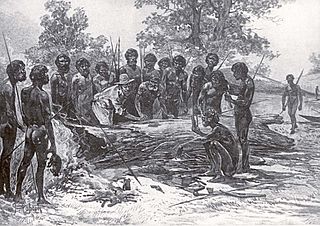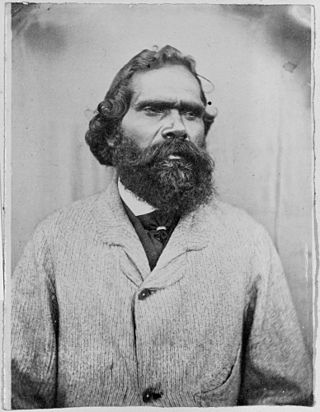The history of Melbourne details the city's growth from a fledgling settlement into a modern commercial and financial centre as Australia's second largest city, Melbourne, in the state of Victoria.

The Wurundjeripeople are an Australian Aboriginal people of the Woiwurrung language group, in the Kulin nation. They are the traditional owners of the Birrarung Valley, covering much of the present location of Narrm (Melbourne). They continue to live in this area and throughout Australia. They were called the Yarra tribe by early European colonists.

The Kulin nation is an alliance of five Aboriginal nations in south central Victoria, Australia. Their collective territory extends around Port Phillip and Western Port, up into the Great Dividing Range and the Loddon and Goulburn River valleys.

John Batman was an Australian grazier, entrepreneur and explorer. He is best known for his role in the founding of Melbourne.

William Barak, named Beruk by his parents,, the "last chief of the Yarra Yarra tribe", was the last traditional ngurungaeta (elder) of the Wurundjeri-willam clan, the pre-colonial inhabitants of present-day Melbourne, Australia. He became an influential spokesman for Aboriginal social justice and an important informant on Wurundjeri cultural lore.
The Boonwurrung people are an Aboriginal people of the Kulin nation, who are the traditional owners of the land from the Werribee River to Wilsons Promontory in the Australian state of Victoria. Their territory includes part of what is now the city and suburbs of Melbourne. They were called the Western Port or Port Philip tribe by the early settlers, and were in alliance with other tribes in the Kulin nation, having particularly strong ties to the Wurundjeri people.

Batman's Treaty was an agreement between John Batman, an Australian grazier, businessman and coloniser, and a group of Wurundjeri elders, for the purchase of land around Port Phillip, near the present site of Melbourne. The document came to be known as Batman's Treaty and is considered significant as it was the first and only documented time when Europeans negotiated their presence and occupation of Aboriginal lands directly with the traditional owners. The treaty was implicitly declared void on 26 August 1835 by the Governor of New South Wales, Richard Bourke.

The city of Melbourne was founded in 1835. The exact circumstances of the foundation of Melbourne, and the question of who should take credit, have long been matters of dispute.
The Wadawurrung nation, also called the Wathaurong, Wathaurung, and Wadda Wurrung, are an Aboriginal Australian people living in the area near Melbourne, Geelong and the Bellarine Peninsula in the state of Victoria. They are part of the Kulin alliance. The Wathaurong language was spoken by 25 clans south of the Werribee River and the Bellarine Peninsula to Streatham. The area they inhabit has been occupied for at least the last 25,000 years.
The Port Phillip Association was formally formed in June 1835 to settle land in what would become Melbourne, which the association believed had been acquired by John Batman for the association from Wurundjeri elders after he had obtained their marks to a document, which came to be known as Batman's Treaty.

Simon Wonga (1824–1874), ngurungaeta and son of Billibellary, was an elder of the Wurundjeri people, who lived in the Melbourne area of Australia before European settlement. He was resolute that his people would survive the "onslaught" of white men.

Coranderrk was an Aboriginal reserve run by the Victorian government between 1863 and 1924, located around 50 kilometres (31 mi) north-east of Melbourne. The residents were mainly of the Woiwurrung, Bunurong and Taungurung peoples, and the first inhabitants chose the site of the reserve.
An Ngurungaeta is a Woiwurrung head man or tribal leader of clans of the Woiwurrung tribes and Taungurung Ngurai-illum Wurrung. Ngurungaeta held the same tribal standing as an Arweet of the Bunurong and Wathaurong people. The current Ngurungaeta is Murrundindi. The term became of particular importance as an identifier of senior men prepared to accept Anglo control in the latter part of the 19th century. It is unlikely that the term was used to express genuine recognition of senior members of traditional groups in the Melbourne area after the 1840s, following the death of Billibellary c. 1846.

Woiwurrung and Taungurung are Aboriginal languages of the Kulin Nation of Central Victoria. Woiwurrung was spoken by the Woiwurrung and related peoples in the Yarra River (Birrarung) basin, and Taungurung by the Taungurung people north of the Great Dividing Range in the Goulburn River Valley around Mansfield, Benalla and Heathcote. They are often portrayed as distinct languages, but they were mutually intelligible. Ngurai-illamwurrung (Ngurraiillam) may have been a clan name, a dialect, or a closely related language.
James Wandin, also known as Jim, Jimmy, or Juby, was the ngurungaeta of the Wurundjeri till his death in February 2006. He was the first Australian rules footballer of Aboriginal descent to play with St Kilda Football Club in 1952–1953.
Billibellary was a song maker and influential ngurungaeta of the Wurundjeri-willam clan during the early years of European settlement of Melbourne. He was known by various names including Billi-billeri, Billibellary, Jika Jika, Jacky Jacky and Jaga Jaga. He was an astute and diplomatic leader, described as powerfully built with an influence and reputation that extended well beyond his clan.
Melbourne Day is an annual celebration to mark the founding of Melbourne in Victoria, Australia, on 30 August 1835.
The Yalukit or Yalukit-willam people are a constituent clan of the Boonwurrung peoples. The Yalukit are the earliest Aboriginal inhabitants of the central bay-side region of Melbourne (Birrarung-ga). The Yalukit have inhabited the central bay-side areas of Melbourne for thousands of years.

The Woiwurrung, also spelt Woi Wurrung, Woiwurrong, Woiworung, Wuywurung, are an Aboriginal Australian people of the Woiwurrung language group, in the Kulin alliance.







